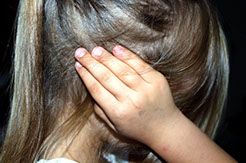
Omega Solutions
Behaviour Strategies and Training

Omega,
Sidsaph Hill,
Walkeringham,
DN10 4HP
Tel. 07540 707356 (Kevin) Email: khayes@omegasolutions.co.uk
07968 423795 (Julie) Email: sensory@omegasolutions.co.uk
Attachment - what goes wrong?
Factors affecting the attachment process are quite varied and extensive. They might include some of the following:

• children who are fostered/adopted;
• children born prematurely where there has been no opportunity to bond as a result of the baby being confined to an incubator;
• post-natal depression;
• parental rejection;
• neglect;
• substance abuse by the mother;
• abuse (emotional, physical);
• parental separation which leads to chaotic contact with one or other of the parents;
• frequent moves;
• other factors which have impaired the child-parent attachment.
It is important to note that attachment difficulties are not confined to children who are not with their birth family. It also has nothing to do with the love of the child by parents - the most loving parents may be unable to facilitate the attachment process for a wide variety of reasons.
One thing that surprised us in researching attachment is that the effects of familial neglect are far more pervasive and damaging than the effects of abuse. That is not to play down the impact of abuse, which is wholly unacceptable and damaging to those involved but it should be recognised that neglect is far more likely to be encountered than abuse.
In many homes, conflict between parents and children develops in a regular and predictable sequence. The child does or says something “wrong.” The parent reacts by criticising. The child replies with something worse. The parent comes back with further threats or with high-handed punishment. And the free-for-all is on. Who needs to avoid escalation? The child doesn’t have the skills so the adult must take responsibility.
Use guidance, not criticism – avoid passing on a negative opinion of the child.
• In criticism parents attack children's personality attributes and their character.
• In guidance we state the problem and a possible solution. We say nothing to the child about himself or herself.
If your child were to accidentally spill a glass of juice, comment calmly, “I see the juice spilled. Let's get another glass of juice, and a cloth.”
Parental criticism is unhelpful. It creates anger and resentment. Even worse, children who are regularly criticised learn to condemn themselves and others. They learn to doubt their own worth and to belittle the value of others – if they are rubbish then other people are rubbish. They learn to suspect people and to expect personal doom. The child will develop a sense that the adult has a motive to make them unhappy deliberately – they will not be able to see it from the adult’s perspective (this is particularly so for children on the autistic spectrum).
It is amazing how many negative and demeaning comments parents make in the presence of their children without realizing their hurtful and destructive consequences. . If it has been a tough day at home the last thing the child needs to hear is one parent giving a run-down of their perceived shortcoming to the other parent.
Anything like this sound familiar?:
• “From the moment he was born he was nothing but trouble and he's been nothing but trouble ever since.”
• “She's just like her mother. Stubborn. She does what she wants. We have no control over her.”
• “All he know is gimme, gimme. But he's never satisfied, no matter how much you give him.”
• “He takes up every moment of my day. He's into everything. I have to watch him like a hawk.”
Unfortunately, children take these remarks seriously. Little children especially depend on their parents to tell them who they are and what they are capable of becoming. For children to develop a worthwhile sense of themselves, they need to hear and overhear mostly positive remarks about themselves.
It's ironic that many parents find it easier to point out what's wrong with their children than what's right with them. Yet, if we want our children to grow up feeling confident and self-assured, we need to take every opportunity to emphasize the positive and avoid demeaning comments.
Copyright © Kevin & Julie Hayes 2021